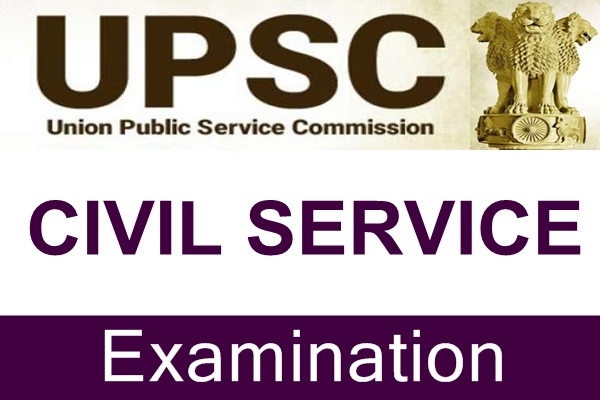



|
Tweet
Pin
It
|
Exam Details :
All India Combined Competitive Examination for the Civil Services conducted by the Union Public Service Commission (UPSC) comprises of two successive stages:
The Preliminary Examination is held in May/June and the Main Examination in October/November. One must begin preparations of the main exam along with preliminary exam. This is because there is little time for the Main exam if one waits for the results of the Preliminaries. A candidate is permitted 4 attempts at the examination. If a person appears in the Preliminary Exam or even appears in one paper, it is counted as an attempt.
Preliminary Examination will consist of two papers of Objective type (multiple choice questions). Paper I is of general studies (200marks) and paper II (200marks) is an aptitude test. The question papers are set in Hindi as well as in English. Each paper is of two hours duration. Blind candidates are allowed an extra time of 20 minutes for each paper. Preliminary Examination is meant to serve as a screening test only; the marks obtained by the candidates who are declared qualified for admission to the Main Examination will not be counted for determining their final order of merit. Only those candidates who are declared by the Commission to have qualified in the Preliminary Examination in a year will be eligible for admission to the Main Examination of that year provided they are otherwise eligible for admission to the Main Examination.
Main Examination is intended to assess the overall intellectual traits and depth of understanding of candidates rather than merely the range of their information and memory. It will consist of a written examination and an interview test. The written examination will consist of 9 papers of conventional essay type in the selected subjects for main examination. Each paper is of 3 hours duration. Blind candidates will, however be allowed an extra time of thirty minutes at each paper.
Candidates will have the option to answer all the question papers, except the language papers viz. Papers I and II above in any one of the languages in cluded in the Eighth Schedule to the Constitution or in English. Candidates exercising the option to answer papers III to IX in any one of the languages included in the Eighth Schedule to the Constitution may, if they so desire, give English version within brackets of only the description of the technical terms, if any, in addition to the version in the language opted by them. The question papers other than language papers will be set both in Hindi and English.
Papers for main examination :
| Paper I | One of the Indian languages to be selected by the candidate from the Languages included in the Eighth Scheduled to the Constitution. | 300 marks |
| Paper II | English | 300 marks |
| Paper III | Essay | 200 marks |
| Papers IV and V | General Studies | 300 marks for each paper |
| Papers VI, VII, VIII and IX | Any two subjects to be selected from the list of the optional subjects. Each subject will have two papers. | 300 marks for each paper |
Optional subjects for Main Examination : Optional Subjects
for the main examination can be chosen from 25 subjects, and the literature
of one of the 30 specified languages.
The subjects include :
Agriculture, Animal Husbandry and Veterinary Science, Anthropology,Botany,
Chemistry, Civil Engineering, Commerce and accountancy, Economics, Electrical
Engineering, Geography, Geology, History, Law, Management, Mathematics,
Mechanical Engineering, Medical Science, Philosophy, Physics, Political
Science and International relations, Psychology, Public Administration,
Sociology, Statistics, Zoology.
Literature of one of the following languages: Arabic, Assamese, Bodo, Bengali, Dogri, Chinese, English, French, German, Gujarati, Hindi, Kannada, Kashmiri, Konkani, Maithili, Malayalam, Manipuri, Marathi, Nepali, Oriya, Pali, Persian, Punjabi, Russian, Sanskrit, Santali, Sindhi, Tamil, Telugu and Urdu.
Candidates will not be allowed to offer the following combinations of subjects :
Notes :
Interview Test: (carry 300 marks with no minimum qualifying marks)
Candidates who obtain minimum qualifying marks in the written part of the Main Examination shall be summoned for an interview. It is usually conducted in the month of April/May every year. The candidate will be interviewed by a Board who will have before them a record of his career. He/ She will be asked questions on matters of general interest. The object of the interview is to assess the personal suitability of the candidate for a career in public service by a Board of competent and unbiased observers. The test is intended to judge the mental calibre of a candidate. In broad terms this is really an assessment of not only his intellectual qualities but also social traits and his interst in current affairs. Some of the qualities to be judged are mental alertness, critical powers of assimilation, clear and logical exposition, balance of judgement, variety and depth of interest, ability for social cohesion and leadership, intellectual and moral integrity.
Marks thus obtained by the candidates in the Main Examination (written part as well as interview) would determine their final ranking. Candidates will be allotted to the various Services keeping in view their ranks in the examination and the preferences expressed by them for the various Services and posts.
There is also a medical test, especially rigid for IPS. Out of the final candidates selected top rankers are appointed as IAS officers.
Once appointed, all probationary officers of the All India and Central Services undergo a compulsory foundation training.
Find it Useful ? Help Others by Sharing Online
Comments and Discussions |
Related
Competitive Exams
|
|||
|
|